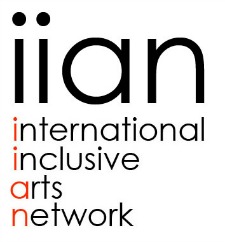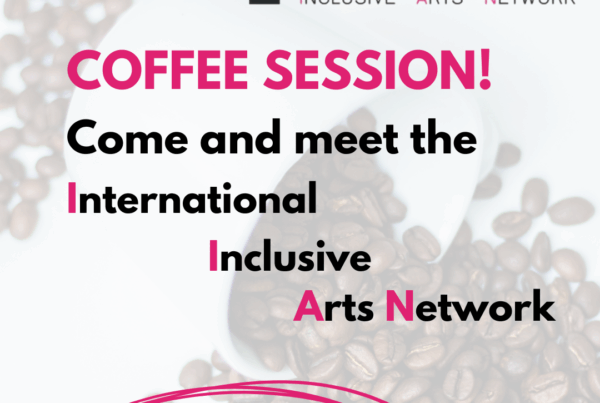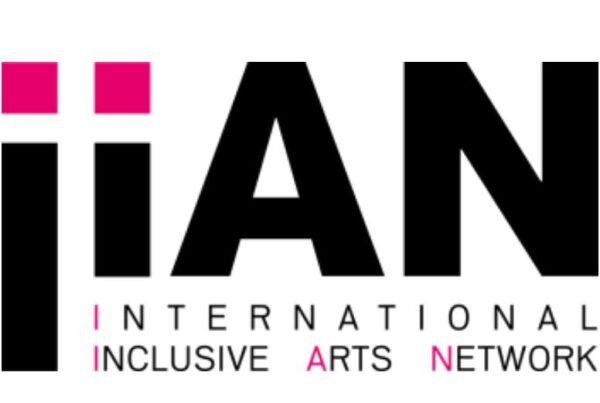At the ASSITEJ Gala at Augenblick-Mal representatives from TYA UK and TYA Ireland presented On The Edge as the next ASSITEJ Artistic Gathering which will take place from July 2-10th 2016 in Birmingham.
The city of Birmingham is one of the most culturally diverse cities in the UK and has one of the youngest populations in Europe. The main festival centre for On The Edge will be Birmingham Repertory Theatre with all venues within a 10 minute walk of the city centre. The festival will showcase up to 20 productions from the UK, Ireland and from around the world.
Call-outs for workshops and seminars for On The Edge, and for the Next Generation programme will be advertised this summer. In the meantime, you can register your interest in the Festival and Gathering at the On The Edge website http://www.ontheedge2016.com
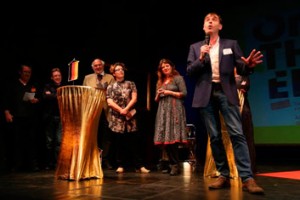
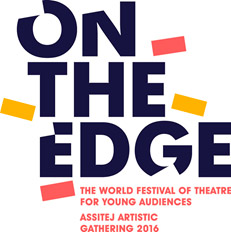
At the ASSITEJ Gala at Augenblick-Mal representatives from TYA UK and TYA Ireland presented On The Edge as the next ASSITEJ Artistic Gathering which will take place from July 2-10th 2016 in Birmingham.
The city of Birmingham is one of the most culturally diverse cities in the UK and has one of the youngest populations in Europe. The main festival centre for On The Edge will be Birmingham Repertory Theatre with all venues within a 10 minute walk of the city centre. The festival will showcase up to 20 productions from the UK, Ireland and from around the world.
Call-outs for workshops and seminars for On The Edge, and for the Next Generation programme will be advertised this summer. In the meantime, you can register your interest in the Festival and Gathering at the On The Edge website http://www.ontheedge2016.com
At the ASSITEJ Gala at Augenblick-Mal representatives from TYA UK and TYA Ireland presented On The Edge as the next ASSITEJ Artistic Gathering which will take place from July 2-10th 2016 in Birmingham.
The city of Birmingham is one of the most culturally diverse cities in the UK and has one of the youngest populations in Europe. The main festival centre for On The Edge will be Birmingham Repertory Theatre with all venues within a 10 minute walk of the city centre. The festival will showcase up to 20 productions from the UK, Ireland and from around the world.
Call-outs for workshops and seminars for On The Edge, and for the Next Generation programme will be advertised this summer. In the meantime, you can register your interest in the Festival and Gathering at the On The Edge website http://www.ontheedge2016.com

At the ASSITEJ Gala at Augenblick-Mal representatives from TYA UK and TYA Ireland presented On The Edge as the next ASSITEJ Artistic Gathering which will take place from July 2-10th 2016 in Birmingham.
The city of Birmingham is one of the most culturally diverse cities in the UK and has one of the youngest populations in Europe. The main festival centre for On The Edge will be Birmingham Repertory Theatre with all venues within a 10 minute walk of the city centre. The festival will showcase up to 20 productions from the UK, Ireland and from around the world.
Call-outs for workshops and seminars for On The Edge, and for the Next Generation programme will be advertised this summer. In the meantime, you can register your interest in the Festival and Gathering at the On The Edge website http://www.ontheedge2016.com
At the ASSITEJ Gala at Augenblick-Mal representatives from TYA UK and TYA Ireland presented On The Edge as the next ASSITEJ Artistic Gathering which will take place from July 2-10th 2016 in Birmingham.
The city of Birmingham is one of the most culturally diverse cities in the UK and has one of the youngest populations in Europe. The main festival centre for On The Edge will be Birmingham Repertory Theatre with all venues within a 10 minute walk of the city centre. The festival will showcase up to 20 productions from the UK, Ireland and from around the world.
Call-outs for workshops and seminars for On The Edge, and for the Next Generation programme will be advertised this summer. In the meantime, you can register your interest in the Festival and Gathering at the On The Edge website http://www.ontheedge2016.com

Resumee by Stefan Fischer-Fels (notes)
Walking around,
I tried to link these 2 issues to the Assitej “motto” of “ONE STEP BEYOND”: Looking for thougths beyond the routines, maybe interesting for next Gathering in Birmingham July 2016:
4 (Generation Porn): Which strategies do we have in TYA to protest or comment our sexualized society? The experience was expressed, that in plays like “trashedy” or “bodybild” there were convoncing moments by authentic performers, who were facing their issue personally, honestly, without taboos, including their doubts, hopes and hopelessness.
2 (Global Issues): I am tired to see in theatre: to look inside myself, talk about me and my family. I am part of a society, a global society, a society destroying themselves. I want to talk about (my) responsibility.
11 (What do we know about children): How can we create more Space and Time in the theater dayly work to find out deeper what moves children? Answer: This is a question of your own priorities.
3 (Me and my body / 5 Can theatre change the world): Some spoke about a conservative rollback in europe (and elsewhere too) of censorship and self-censorship. How can we fight against this movement? The experience was expressed that every artist has to go his artistic way following his conviction + trying hard to transfer, argue, fight for his artistic way. This is not the easy way. A whole economic system has other interests.
10 (Media on stage): The live-event “theater” will never die. But, if we like it or not, Digitalisation will change the life of the young generation, so will change the theater and its reception. We have to analyse that. We have to do more research about that.
9 (Images of childhood): Which indications do we have to define the contemporary image of childhood in our societies? Look at Medias, school organisation, parent behaviour, time frames, state ideologies etc. – Is there an “official image”, is there a “common sense”, is there a hidden “practice”?
1 (Talk to me! How talk to Audience?): We are talking all the time about “participation” and “interactive theater”. But in our society: Are we ready to let children participate? Do we want to hear their voice? participation is a categorie of “democracy”. Do we let children participate in our “democratic system”?
11 (children and adults on stage): There are many questions about the production “Rauw”. One way to look at it could be: It is telling us about a new equal relationship between adults and children (not anymore the issue of “authorities against rightless children”): We should try to create new “dramaturgies” according to contemporary images of childhood.
It is in our hands to finds answers to these questions. Lets get “one step beyond” with it – an meet in Birmingham to share our researches!
26.4.15
SFF
I have heard the discussions for a last couple of days with tremendous interest. It was interesting that we could see the current situation of the culture for children and theatre transparently through each one of opinion supported by their own experiences. And having heard all the opinions, it was obvious that the relationships between the participants were changing as they spoke. There were confirmations of similarities and differences. The confirmation of similarity creates a sense of security and the confirmation of difference creates a sense of fretfulness by desire to know the reason for difference. And it was for me like watching a play to see the changes and so much fun. It was a magnificent collaboration performance with the first act of 3 and a half hours performed on the 24th and the second act of 2 and a half hours performed on the 25th. And the title was ASSITEJ’s tomorrow or Tomorrow of the World of TYA.
Meanwhile this is not unusual case to see a moderator speaking too much, being conscious too much of settling a conversation or a participant who cannot say a word. But after all, we could say it was a fruitful time, and perhaps it would be better only if we had more time.
In addition, if I can be a bit greedier, I would’ve liked to have some questions regarding the relations between education and theatre, having acknowledged the role of theatre accomplished for a child’s growth.
Also, I’d like to have an opportunity to discuss about the theatrical traditions original of each country. As a director from a country where there is a heritage, that is the nature of traditional theatre, handed down blindly today after 100 years, holding a history neglecting the tradition of theatre, which wronged the theatre’s history itself when a modern theatre is imported.
And to conclude, there are some people who I personally want to hear their impressions from. They are the participants from North Koreans. On the first day they were expressionless but as the time passed, they were changing and at the end we saw smiles on their faces. And it was the participants from South Korea, supporting them with interpretation. It was beautiful to see it. Yvette, the President, invited them to come to the Congress in South Africa and I invited them to participate the Asia Fes, which we are currently planning. If these invitations are actualized, we’ll have the beautiful Epilogue of this magnificent collaboration play.
I have heard the discussions for a last couple of days with tremendous interest. It was interesting that we could see the current situation of the culture for children and theatre transparently through each one of opinion supported by their own experiences. And having heard all the opinions, it was obvious that the relationships between the participants were changing as they spoke. There were confirmations of similarities and differences. The confirmation of similarity creates a sense of security and the confirmation of difference creates a sense of fretfulness by desire to know the reason for difference. And it was for me like watching a play to see the changes and so much fun. It was a magnificent collaboration performance with the first act of 3 and a half hours performed on the 24th and the second act of 2 and a half hours performed on the 25th. And the title was ASSITEJ’s tomorrow or Tomorrow of the World of TYA.
Meanwhile this is not unusual case to see a moderator speaking too much, being conscious too much of settling a conversation or a participant who cannot say a word. But after all, we could say it was a fruitful time, and perhaps it would be better only if we had more time.
In addition, if I can be a bit greedier, I would’ve liked to have some questions regarding the relations between education and theatre, having acknowledged the role of theatre accomplished for a child’s growth.
Also, I’d like to have an opportunity to discuss about the theatrical traditions original of each country. As a director from a country where there is a heritage, that is the nature of traditional theatre, handed down blindly today after 100 years, holding a history neglecting the tradition of theatre, which wronged the theatre’s history itself when a modern theatre is imported.
And to conclude, there are some people who I personally want to hear their impressions from. They are the participants from North Koreans. On the first day they were expressionless but as the time passed, they were changing and at the end we saw smiles on their faces. And it was the participants from South Korea, supporting them with interpretation. It was beautiful to see it. Yvette, the President, invited them to come to the Congress in South Africa and I invited them to participate the Asia Fes, which we are currently planning. If these invitations are actualized, we’ll have the beautiful Epilogue of this magnificent collaboration play.
I have heard the discussions for a last couple of days with tremendous interest. It was interesting that we could see the current situation of the culture for children and theatre transparently through each one of opinion supported by their own experiences. And having heard all the opinions, it was obvious that the relationships between the participants were changing as they spoke. There were confirmations of similarities and differences. The confirmation of similarity creates a sense of security and the confirmation of difference creates a sense of fretfulness by desire to know the reason for difference. And it was for me like watching a play to see the changes and so much fun. It was a magnificent collaboration performance with the first act of 3 and a half hours performed on the 24th and the second act of 2 and a half hours performed on the 25th. And the title was ASSITEJ’s tomorrow or Tomorrow of the World of TYA.
Meanwhile this is not unusual case to see a moderator speaking too much, being conscious too much of settling a conversation or a participant who cannot say a word. But after all, we could say it was a fruitful time, and perhaps it would be better only if we had more time.
In addition, if I can be a bit greedier, I would’ve liked to have some questions regarding the relations between education and theatre, having acknowledged the role of theatre accomplished for a child’s growth.
Also, I’d like to have an opportunity to discuss about the theatrical traditions original of each country. As a director from a country where there is a heritage, that is the nature of traditional theatre, handed down blindly today after 100 years, holding a history neglecting the tradition of theatre, which wronged the theatre’s history itself when a modern theatre is imported.
And to conclude, there are some people who I personally want to hear their impressions from. They are the participants from North Koreans. On the first day they were expressionless but as the time passed, they were changing and at the end we saw smiles on their faces. And it was the participants from South Korea, supporting them with interpretation. It was beautiful to see it. Yvette, the President, invited them to come to the Congress in South Africa and I invited them to participate the Asia Fes, which we are currently planning. If these invitations are actualized, we’ll have the beautiful Epilogue of this magnificent collaboration play.
I have heard the discussions for a last couple of days with tremendous interest. It was interesting that we could see the current situation of the culture for children and theatre transparently through each one of opinion supported by their own experiences. And having heard all the opinions, it was obvious that the relationships between the participants were changing as they spoke. There were confirmations of similarities and differences. The confirmation of similarity creates a sense of security and the confirmation of difference creates a sense of fretfulness by desire to know the reason for difference. And it was for me like watching a play to see the changes and so much fun. It was a magnificent collaboration performance with the first act of 3 and a half hours performed on the 24th and the second act of 2 and a half hours performed on the 25th. And the title was ASSITEJ’s tomorrow or Tomorrow of the World of TYA.
Meanwhile this is not unusual case to see a moderator speaking too much, being conscious too much of settling a conversation or a participant who cannot say a word. But after all, we could say it was a fruitful time, and perhaps it would be better only if we had more time.
In addition, if I can be a bit greedier, I would’ve liked to have some questions regarding the relations between education and theatre, having acknowledged the role of theatre accomplished for a child’s growth.
Also, I’d like to have an opportunity to discuss about the theatrical traditions original of each country. As a director from a country where there is a heritage, that is the nature of traditional theatre, handed down blindly today after 100 years, holding a history neglecting the tradition of theatre, which wronged the theatre’s history itself when a modern theatre is imported.
And to conclude, there are some people who I personally want to hear their impressions from. They are the participants from North Koreans. On the first day they were expressionless but as the time passed, they were changing and at the end we saw smiles on their faces. And it was the participants from South Korea, supporting them with interpretation. It was beautiful to see it. Yvette, the President, invited them to come to the Congress in South Africa and I invited them to participate the Asia Fes, which we are currently planning. If these invitations are actualized, we’ll have the beautiful Epilogue of this magnificent collaboration play.
This year, the Next Generation Program was one of the largest there has been in an Artistic Gathering, with 42 participants from Germany and 20 other countries.
We want to thank ASSITEJ Germany once more for the generous support given to participants from the following countries:
Argentina, Brazil, Cameroon, Colombia, Cuba, India, Iran, Mexico, Nepal, Nigeria, North Korea, Rwanda, Serbia, South Africa, South Korea, Swaziland, Turkey, Uruguay and Zimbabwe
As a conclusion to their program, Next Generation 2015 came up with the following manifesto:
If I were President of ASSITEJ:
1. I would change the world map and erase all borders.
2. I would listen to the children and let THEM do all the talking.
3. I would involve government to support low profile countries.
4. I would make sure that children and young people have a theatrical culture.
5. I would remember I was also a child once, and run to get some ice cream.
6. TYA shall be the healing pill to deadly diseases of fear, hate, war and silence.
7. I would like to make educational performances for young audience.
8. I would like to give an opportunity to children, who have never seen a show.
9. I would create programs & policies in Africa to allow the children to have access to theatre.
10. I would make ASSITEJ a more inclusive and horizontal association.
11. I would lead TYA to play an important role in young people’s development.
12. I would give TYA the relevance it deserves and make it the major priority.
13. I would need to stay in touch with children and young people, so I can know their point of view, their issues.
14. I wouldn’t make people write about what they will do if they were president of ASSITEJ.
15. I would invent a theatrical pain relief to save children who have lost a loved one.
16. I would ignore all the economic differences between the member countries of ASSITEJ and divide the global budget equally.
17. Something would be really wrong with the electoral system.
18. I would introduce children and teenaged members of the ASSITEJ boards in all countries.
19. I would focus on children’s rights and advocacy through theatre and make them more participative, especially in African countries.
20. I would strengthen the actions and presence of their representatives in countries with low budgets.
21. I would establish theatre performances in public spaces during the festival.
22. I would create an international free TV station around the world.
23. I would offer more spaces for the direct interaction between children, adults and artists.
24. I would ask children: “What do you expect from us?”
25. I would create a space for differences and passion.
26. A group of children and young people would be president and I would be their secretary.
27. I would spread the word that “everything is possible”.
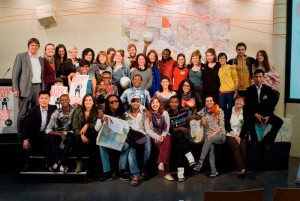
If I were President of ASSITEJ:
1. I would change the world map and erase all borders.
2. I would listen to the children and let THEM do all the talking.
3. I would involve government to support low profile countries.
4. I would make sure that children and young people have a theatrical culture.
5. I would remember I was also a child once, and run to get some ice cream.
6. TYA shall be the healing pill to deadly diseases of fear, hate, war and silence.
7. I would like to make educational performances for young audience.
8. I would like to give an opportunity to children, who have never seen a show.
9. I would create programs & policies in Africa to allow the children to have access to theatre.
10. I would make ASSITEJ a more inclusive and horizontal association.
11. I would lead TYA to play an important role in young people’s development.
12. I would give TYA the relevance it deserves and make it the major priority.
13. I would need to stay in touch with children and young people, so I can know their point of view, their issues.
14. I wouldn’t make people write about what they will do if they were president of ASSITEJ.
15. I would invent a theatrical pain relief to save children who have lost a loved one.
16. I would ignore all the economic differences between the member countries of ASSITEJ and divide the global budget equally.
17. Something would be really wrong with the electoral system.
18. I would introduce children and teenaged members of the ASSITEJ boards in all countries.
19. I would focus on children’s rights and advocacy through theatre and make them more participative, especially in African countries.
20. I would strengthen the actions and presence of their representatives in countries with low budgets.
21. I would establish theatre performances in public spaces during the festival.
22. I would create an international free TV station around the world.
23. I would offer more spaces for the direct interaction between children, adults and artists.
24. I would ask children: “What do you expect from us?”
25. I would create a space for differences and passion.
26. A group of children and young people would be president and I would be their secretary.
27. I would spread the word that “everything is possible”.
An update from Augenblick mal! and the ASSITEJ Artistic Gathering in Berlin.
IIAN enjoyed our time in Berlin and meeting with lots of international delegates and engaging in numerous discussion about inclusive theatre for young audiences.
This started with the first Artistic Gathering where, along with the other ASSITEJ Networks, IIAN took part in a ‘market place’ event which allowed us to have a space to meet and discuss our work with all the delegates. This allowed us to have a conversation with artists and theatre makers from all over the world to promote our work but also gather information about the situation of access and inclusion in many new countries. Moving forward IIAN is looking to work with ‘country champions’ who will be an IIAN lead contact in each country, so it was a great place to start to meet people who want to be involved.
IIAN also worked with Berlin based ‘RambaZamba’, a theatre and art studio for artists and performers with learning disabilities, RambaZamba is Germany’s most important inclusive theatre, so we were excited to hold a joint public moment. We presented a show from RambaZamba called ‘Alice in Flight’ which was inspired by Alice in Wonderland. The Public moment was well attended and was followed by a panel discussion involving, performers, directors and IIAN’s Daryl Beeton. The panel discussion was about themes, taboo’s and asked the question, are there any issues that can’t be told in Inclusive theatre? The discussion was lively and focussed on the power of the work rather than a discussion about ramps, which was fantastic as this is the type of discussion that’s important to IIAN.
Finally IIAN were really pleased that ASSITEJ Executive Committee have put into action some suggestions about access and inclusion for future festivals which will mean that access and inclusion is truly being valued by all.


